IMAGES DE LA STATION DE FECAMP PENDANT LA GUERRE
Views of Fecamp transmitter during the war
(photos extraites du livre Fécamp 1939-1945 de Max Lemaître et Jean-Paul Duboscq, Eds L. Durand & Fils - 1994)
10 juin 1940 : 18 heures, à Fécamp, avant l'arrivée prochaine des Allemands, les troupes françaises
détruisent l'émetteur et les installations techniques, coupent les câbles de départ vers les antennes.
Les pylônes désormais inutiles sont néanmoins sauvegardés
10 June 1940: 6 p.m., in Fécamp, before the Germans arrived soon, French troops destroyed
the transmitter and the technical installations, and cut the cables leading to the antennas.
The pylons, now useless, were nevertheless saved.
|

|
Le bâtiment des machines avant la guerre, utilisé une dernière fois de septembre 1939 au vendredi 3 janvier 1940 par la station de l'IBC Radio International. A l'intérieur, les installations sont rendues inutilisables par les troupes françaises le 10 juin 1940 à 18 h 00, veille de l'invasion des troupes hitlériennes dans Fécamp
The engine house before the war, used for the last time from September 1939 to Friday, January 3, 1940 by the IBC Radio International station. Inside, the installations were rendered unusable by the French troops on June 10, 1940 at 6:00 p.m., the day before the invasion of Hitler's troops in Fécamp.
|

|
Tableau endommagé et câbles sectionnés de la distribution électrique et de répartition de départ d'alimentation des antennes
Damaged switchboard and power distribution severed cables and starting distribution for antenna power

Réserve de matériel de la station dans laquelle sont entreposés les transformateurs électriques
Equipment reserve of the station in which the electrical transformers are stored
|

11 juin 1940 : les Allemands envahissent Fécamp, investissent la "Maison de la Radio" rue de Boulogne et y installent leur "Standortkommandantur"
11 June 1940: the Germans invade Fécamp, take over the "Maison de la Radio" in rue de Boulogne and install their "Standortkommandantur" there
|

Fécamp le 11 juin 1940, l'armée nazie occupe la station. Vue sur le pylône Ouest
Fecamp on June 11, 1940, the Nazy army occupied the station. This is the West pylon
|
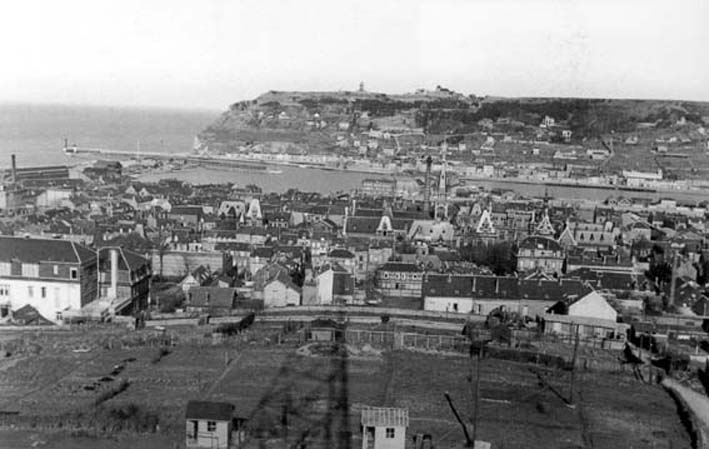
|
1940 : le reporter allemand qui a pris cette vue de Fécamp est grimpé dans un des pylônes de la radio dont on aperçoit l'ombre. On peut distinguer le clocher de la Bénédictine, la cheminée de la distillerie, le port et les jetées
1940: the German reporter who took this view of Fecamp climbed into one of the radio pylons whose shadow we can see. We can distinguish the Benedictine bell tower, the chimney of the distillery, the port and the piers.
|

|
Le pylône côté Est
 Le jeudi 7 novembre 1940, vers 2 h 15 du matin, au cours d'une très forte tempête, le pylône Ouest se tord sur sa base comme pris de convulsion puis s'effondre dans les jardins jouxtant l'orphelinat Saint-Michel, dans un fracas épouvantable de ferraille, arrachant de terre son énorme assise en béton. Le pylône côté Est, pouvant servir d'amer aux alliés, sera dynamité par les Nazis le 12 novembre 1943 Le jeudi 7 novembre 1940, vers 2 h 15 du matin, au cours d'une très forte tempête, le pylône Ouest se tord sur sa base comme pris de convulsion puis s'effondre dans les jardins jouxtant l'orphelinat Saint-Michel, dans un fracas épouvantable de ferraille, arrachant de terre son énorme assise en béton. Le pylône côté Est, pouvant servir d'amer aux alliés, sera dynamité par les Nazis le 12 novembre 1943
On Thursday, November 7, 1940, at around 2:15 in the morning, during a very strong storm, the West pylon twisted on its base as if in a convulsion and then collapsed into the gardens adjoining the Saint-Michel orphanage, in a terrible crash of scrap metal, tearing its enormous concrete base from the ground. The East pylon, which could serve as a beacon for the Allies, was dynamited by the Nazis on November 12, 1943
|

|
Deux sentinelles allemandes sur la jetée nord. Devant, la falaise du Cap Fagnet se dresse face à la mer
Two German sentries on the north pier. In front, the cliff of Cap Fagnet stands facing the sea |
| |

|
1941 : surveillance au large devant la jetée nord. Au loin, le pylône Est survivant
(le pylône Ouest - qui était plus à droite - est tombé durant la tempête du 7.11.1940)
1941 : offshore surveillance in front of the north jetty. In the distance, the surviving East pylon
(the West pylon - who was on the right - fell during the storm of 7.11.1940)
|
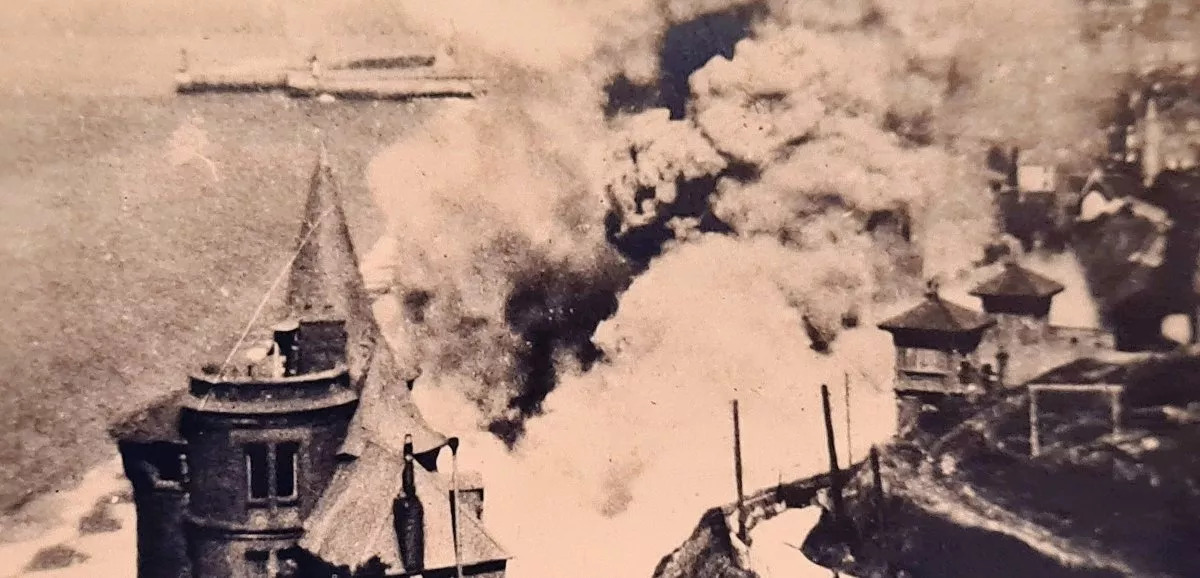
Janvier 1943, l'autorité allemande termine la destruction du luxueux casino de Fécamp
January 1943, the German authorities complete the destruction of the luxurious casino in Fécamp
|
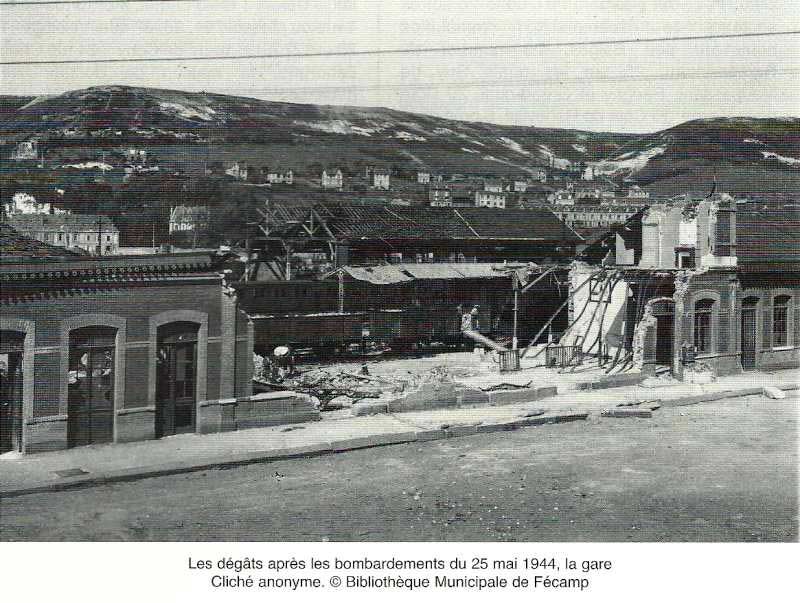
Fécamp
railway station after the bombings of May 25, 1944
|
Dès le début de la guerre, l'État et la censure contrôlent les radios publiques et privées. En juin 1940, alors que l'émetteur de Fécamp est inutilisable, Louvetot reprend du service comme relais, ce qu'il restera désormais toute sa vie. Certains parlent d'une augmentation de sa puissance à 60 kilowatts (1)
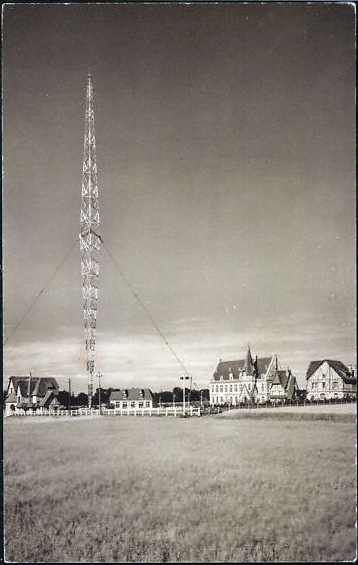 (1) L'émetteur n'a jamais fait plus de 20-25 kW même après la guerre. Aucun témoignage n'est venu confirmer l'arrivée d'un émetteur plus puissant à Louvetot. Après le départ des Allemands, l'armée américaine installera un émetteur de 5 kW pour redémarrer les émissions en attendant l'arrivée d'un émetteur plus puissant de 20 kW avec la RTF. Puis l'émetteur de 5 kW sera utilisé comme matériel de secours. (1) L'émetteur n'a jamais fait plus de 20-25 kW même après la guerre. Aucun témoignage n'est venu confirmer l'arrivée d'un émetteur plus puissant à Louvetot. Après le départ des Allemands, l'armée américaine installera un émetteur de 5 kW pour redémarrer les émissions en attendant l'arrivée d'un émetteur plus puissant de 20 kW avec la RTF. Puis l'émetteur de 5 kW sera utilisé comme matériel de secours.
Début 1941 : l'émetteur de Louvetot occupé par les troupes hitlériennes passe dans le giron de la Propaganda Abteilung et diffuse Radio Paris (radio pro-nazie)
Les Allemands imposent en zone occupée cette seule radio qu'ils contrôlent étroitement :
"Radio Paris ment, Radio Paris est allemand !" répète la BBC que beaucoup écoutent clandestinement.
12 novembre 1943 : à Fécamp, les Nazis dynamitent le dernier pylône intact pouvant servir d'amer à l'aviation alliée (repère possible pour l'aviation alliée). Cette date marque la fin de l'épopée radio à Fécamp.
En mars 1944, les postes de radio doivent être déposés dans les mairies. Certains de ces récepteurs disparaîtront dans les incendies des bombardements, au Havre notamment. |
From the start of the war, the state and censorship controlled public and private radio stations. In June 1940, when the Fécamp transmitter was unusuable, Louvetot resumed service as a relay, which will remain from now on all his life. Some speak of an increase in its power to 60 kilowatts (1).
(1) The transmitter never made more than 20-25 kW even after the war. No testimony has come to confirm the arrival of a more powerful transmitter at Louvetot. After the departure of the Germans, the American army will install a 5 kW transmitter to restart the broadcasts while waiting for the arrival of a more powerful transmitter of 20 kW with the RTF. Then the 5 kW transmitter will be used as backup equipment.
Beginning of 1941: the transmitter of Louvetot occupied by the Hitler's troops becomes part of the Propaganda Abteilung and broadcasts Radio Paris (pro-Nazi radio)
The Germans impose in the occupied zone this only radio which they control closely :
"Radio Paris is lying, Radio Paris is German" repeats the BBC that many listen to clandestinely.
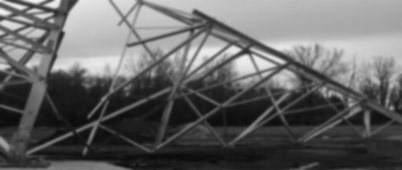 12 November 1943: in Fécamp, the Nazis dynamited the last intact pylon that could be used as a landmark by the Allied air force. This date marks the end of the radio epic in Fécamp. 12 November 1943: in Fécamp, the Nazis dynamited the last intact pylon that could be used as a landmark by the Allied air force. This date marks the end of the radio epic in Fécamp.
In March 1944, the radio sets were to be deposited in the town halls. Some of this receptors will disapear in the fires of the bombardments, in Le Havre in particular. |
|
|
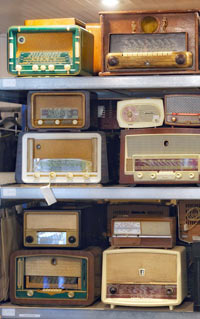 |
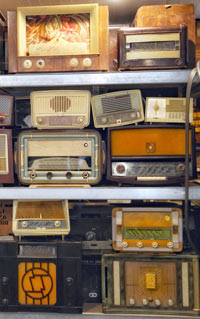
|

|
IMAGES DE LA STATION DE LOUVETOT PENDANT LA GUERRE
Views of Louvetot transmitter during the war
photos M. Jean Lenormand - Yvetot (reprises du "Courrier Cauchois" -> Revue de presse) |

|
En août 1944, les troupes hitlériennes qui avaient muré les fenêtres du bâtiment central ont incendié ce bâtiment
et la toiture a complètement brûlé. Après leur départ, on aperçoit des camions militaires anglais ou américains.
Nous pouvons voir le feeder d'alimentation (gros câble noir) jeté à terre dans les débris.
In August 1944, the Hitler's troops who had bricked up the windows of the central building set fire to this building
and the roof completely burned down. After they leave, we see British or American military trucks.
We can see the power feeder (big black cable) thrown to the ground in the debris.
|
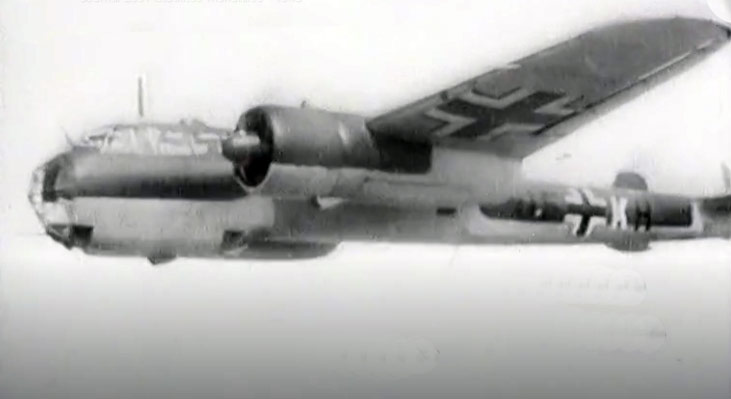 11 août 1944 : vers minuit, un gros bi-moteur allemand qui revenait d'un raid sur l'Angleterre, toucha le pylône. La violence du choc le désempara et il alla s'écraser dans une cour de ferme. Les membres de l'équipage furent carbonisés. L'ennemi qui occupait la station pensait qu'il s'agissait d'un avion anglais mais à leur joie, succéda la stupeur quand ils virent que c'était un avion allemand 11 août 1944 : vers minuit, un gros bi-moteur allemand qui revenait d'un raid sur l'Angleterre, toucha le pylône. La violence du choc le désempara et il alla s'écraser dans une cour de ferme. Les membres de l'équipage furent carbonisés. L'ennemi qui occupait la station pensait qu'il s'agissait d'un avion anglais mais à leur joie, succéda la stupeur quand ils virent que c'était un avion allemand
(d'après la presse locale)
- - - - - - - - - - - - - - - - -
28 août 1944 : avant de fuir, les Nazis abattent complètement le pylône de l'émetteur de Louvetot, le bâtiment principal est saccagé et le toit incendié. Néanmoins les générateurs d'électricité sont épargnés et pourront être réutilisés pour alimenter une minoterie voisine, dès la retraite des Allemands. La farine obtenue a permis aux boulangeries de la région, de relancer la production de pain |
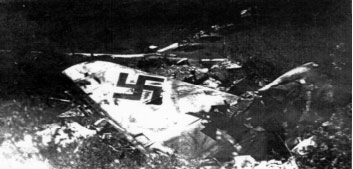 August 11, 1944: around midnight, a large German twin-engine plane returning from a raid on England hit the pylon. The violence of the impact disabled it and it crashed into a farmyard. The crew members were burnt to a crisp. The enemy occupying the station thought it was a British plane but their joy was replaced by astonishment when they saw it was a German plane (according to the local press) August 11, 1944: around midnight, a large German twin-engine plane returning from a raid on England hit the pylon. The violence of the impact disabled it and it crashed into a farmyard. The crew members were burnt to a crisp. The enemy occupying the station thought it was a British plane but their joy was replaced by astonishment when they saw it was a German plane (according to the local press)
- - - - - - - - - - - - - - - - -
August 28, 1944: before fleeing, the Nazis completely demolished the Louvetot transmitter pylon, the main building was ransacked and the roof set on fire. Nevertheless, the electricity generators were spared and could be reused to power a nearby flour mill once the Germans had retreated. The flour obtained enabled the bakeries of the region to restart the production of bread |
|
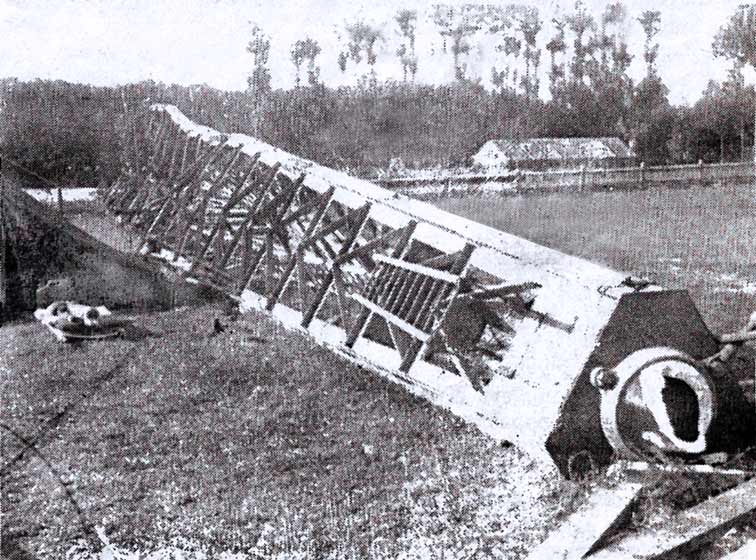
|
Le pylône à terre. On aperçoit la base de porcelaine cassée qui servait d'isolant. Pour l'abattre,
les soldats nazis ont simplement posé une mine sur l'un des trois haubans
The pylon on the ground. We can see the broken porcelain base which served as insulation. To bring it down,
the Nazi soldiers simply laid a mine on one of the three stays
Les photos suivantes sont extraites de notre vidéo VHS "Expo Yvetot FM 1999"
Désolé pour la qualité des photos ! Sorry for the quality of the photos
|
 
Les débris du pylône détruit par les troupes d'Hitler en août 1944
The remains of the pylon destroyed by the Hitler's troops in August 1944
|
 
La salle des machines (alternateurs pour le chauffage des lampes de l'émetteur) après la destruction.
Le palan à droite servait à déplacer les lourds moteurs soumis à de fréquents graissages
The engine room (alternators for heating the transmitter lamps) after destruction.
The hoist on the right was used to move the heavy engines subject to frequent lubrication
|

< Ce qu'il reste de l'étage de puissance incendié
< What remains of the burned-out power stage
|
Après la guerre, des changements dans la réglementation française des médias (instauration du monopole d'Etat) ont rendu impossible la reprise des émissions des stations privées françaises dont Radio-Normandie.
Sean Street - extrait du livre "Radio britannique" |
After the war, changes in French media regulations (establishment of a state monopoly) made it impossible for French private stations, including Radio-Normandie, to resume broadcasting.
Sean Street - from the book "British Radio" |
|
A la libération, le Général de Gaulle interdit la résurrection de la radio commerciale en France, sauf « Radio Luxembourg » qui reprend ses émissions en français. A la déclaration de la guerre le 3 septembre 1939, la BBC avait fermé son programme national et ses programmes régionaux et leur avait substitué un programme unique « Forces programme » consistant en informations et disques. Bien plus tard, ceci a donné le « Light » devenu « BBC Radio 2 ».
Upon liberation, General de Gaulle forbade the resurrection of commercial radio in France, except “Radio Luxembourg” which resumed its broadcasts in French. When war was declared on 3 September 1939, the BBC closed its national and regional programs and replaced them with a single "Forces programme" consisting of news and discs. Much later this gave rise to 'Light' which became 'BBC Radio 2'. |

Après la guerre (1945), remise en route de la station avec deux pylônes provisoires de 50 m de hauteur érigés
à l'arrière du bâtiment principal. Un fil d'antenne (invisible sur la photo) est tendu entre les deux pylônes
After the war (1945), restarting of the station with two temporary pylons 50 m high erected
behind the main building. An antenna wire (invisible in the photo) is stretched between the two pylons |

Acquisition d'un émetteur américain de 5 kW pour démarrer, en attendant l'arrivée à Louvetot d'un nouvel émetteur de 20 kW
Acquisition of a 5 kW American transmitter to start, pending the arrival at Louvetot of a new 20 kW transmitter
|
 L'après-guerre : des espoirs éveillés, des espoirs déçus L'après-guerre : des espoirs éveillés, des espoirs déçus
Peu avant la fin de la Seconde Guerre mondiale, le Parlement français a adopté un décret-loi interdisant la radio privée en France. Certaines stations privées françaises avaient été reprises par les nazis (le sort de Radio Normandie), tandis que d'autres avaient continué à fonctionner, bien que moins indépendamment, sous le gouvernement de Vichy. Désormais, toutes devaient être absorbées par la Radiodiffusion française ou supprimées.
M. Fernand Le Grand fut emprisonné après la guerre, accusé d'avoir collaboré avec l'ennemi.
L'accusation n'a jamais été prouvée (son fils Bruno indique qu'elle était sans fondement et formulée comme une rancune [Confirmé dans le livre de René Duval - cf chapitre Livres]), et ne pouvait de toute façon pas s'appliquer aux activités radiophoniques, puisque la station n'était plus sous son contrôle bien avant l'arrivée des Allemands pour occuper la Normandie.
Il fut libéré au bout d'un an. Son travail à l'usine Bénédictine l'occupait, mais il espérait un jour pouvoir rouvrir la station.
Ses espoirs furent ravivés par deux éléments : Plugge était toujours enthousiaste à l'idée de voir un service anglais de Radio Normandie revitalisé et il alla même jusqu'à commander un nouvel émetteur de 10 kW aux États-Unis à cette fin.
En fait, en 1947, une vague de rapports et de rumeurs circula sur les tentatives de Plugge de reprendre la diffusion de Radio Normandie, mais la pierre d'achoppement demeurait l'interdiction des stations privées en France. Cependant, les gouvernements changeaient si rapidement que, comme le dit une lettre d'un fonctionnaire de la Poste au directeur général de la BBC, William Haley, les récents triomphes de la droite politique française pourraient en effet conduire à une restauration de la radiodiffusion privée (!). Une note de la BBC du 14 janvier 1947 s'est toutefois avérée plus précise à long terme ; elle indiquait que « les gens de l'IBC trouvent les négociations avec l'administration française très difficiles. Il semble qu'ils n'aient aucun doute quant à l'issue, mais ils doivent continuellement tout recommencer en raison des changements ministériels ». L'instabilité du gouvernement français qui avait tant frustré la BBC et le Post Offfice au milieu des années 1930 s'est avérée être l'une des principales raisons pour lesquelles Radio Normandie n'a pas pu revenir sur les ondes car aucun gouvernement français favorable à la radio privée n'a jamais été au pouvoir (ndw : avant 1981).
Il y avait d'autres raisons. Le Grand a eu une crise cardiaque en 1950; bien qu'il s'en soit remis, il ne restait que peu d'enthousiasme pour une renaissance de Radio Normandie. Le Service des Forces Générales de la BBC, devenu renommé après guerre le "Light Programme", constituait une concurrence efficace au type de station incarnée par Radio Normandie. (Une lettre de William Haley du 4 novembre 1947 à un responsable de la Poste déclarait : « Nous avons maintenant un Programme Léger pour tenir les étrangers à distance. ») Plugge avait d'autres perspectives d'affaires pour l'occuper et était à cette époque plutôt moins riche qu'il ne l'était avant la guerre. En bref, la confluence de personnalités, de gouvernements et d’argent, ainsi que la situation concurrentielle de la radio qui existaient dans les années 1930, n’étaient plus présentes.
(extrait de l'essai "Radio Normandie et le défi lancé par l'IBC au monopole de la BBC"
par DONALD R. BROWNE, The University of Minnesota - à retrouver à notre chapitre Livres "1985")
 The post-war period: hopes raised, hopes dashed The post-war period: hopes raised, hopes dashed
Shortly before the end of the Second World War, the French Parliament passed a decree-law banning private radio in France. Some private French stations had been taken over by the Nazis (the fate of Radio Normandie), while others had continued to operate, albeit less independently, under the Vichy government. Henceforth, all of them were to be absorbed by French Radio or suppressed.
Fernand Le Grand was imprisoned after the war, accused of collaborating with the enemy.
The charge was never proven (his son Bruno says it was unfounded and phrased as a grudge [Confirmed in René Duval's book - see Books chapter]), and in any case could not have applied to radio activities, since the station was out of his control long before the Germans arrived to occupy Normandy.
He was released after a year. His work at the Bénédictine factory kept him busy, but he hoped that one day it would be possible to reopen the station.
His hopes were rekindled by two factors: Plugge was still keen to see a revitalised English Radio Normandy service and even went so far as to order a 10kW transmitter from the US for the purpose.
In fact, by 1947 there was a flurry of reports and rumours about Plugge's attempts to resume broadcasting Radio Normandie, but the stumbling block remained the ban on private stations in France. However, governments were changing so rapidly that, as a letter from a Post Office official to BBC Director-General William Haley put it, the recent triumphs of the French political right might indeed lead to a restoration of private broadcasting. However, a BBC memo of 14 January 1947 proved more accurate in the long term, stating that ‘the IBC people are finding negotiations with the French administration very difficult. They seem to have no doubt as to the outcome, but they have to start all over again because of the changes in the Ministers’. The instability of the French government that had so frustrated the BBC and the Post Office in the mid-1930s proved to be one of the main reasons why Radio Normandie could not return to the airwaves: no government favourable to private radio had ever been in power (editor's note: before 1981).
There were other reasons. Le Grand had a heart attack in 1950; although he recovered, there was little enthusiasm left for a revival of Radio Normandie. The BBC's General Forces Service, continued after the war as the Light Programme, provided effective competition to the type of station embodied by Radio Normandie. (A letter from William Haley on 4 November 1947 to a Post Office official stated: ‘We now have a Light Programme to keep the foreigners at bay’). Plugge had other business prospects to occupy him and was by this time rather less wealthy than he had been before the war. In short, the confluence of personalities, governments and money, as well as the competitive situation of radio that existed in the 1930s, were no longer present.
(excerpt from the essay ‘Radio Normandie and the IBC's challenge to the BBC monopoly’)
by DONALD R. BROWNE, The University of Minnesota - to be found in our Books ‘1985’ chapter)
|
Qu'est devenu le centre émetteur de Louvetot
au sortir de la guerre après 1945 ? >
voir ICI
<
What
happened to the Louvetot transmitter center
after the war in 1945? >
see HERE
<

|
L’émetteur de Louvetot qui a servi de relais aux radios d’état, loué à l’O.R.T.F., a été "libéré" par celui-ci en 1974. Le terrain et les bâtiments ont été vendus à un pasteur protestant. La propriété est devenue une maison pour enfants handicapés (église évangélique).
La société anonyme "Emissions Radio Normandie" reste donc en sommeil. |
The Louvetot transmitter, which served as a relay for state radio stations, rented to the ORTF, was vacated by the latter in 1974. The land and buildings were sold to a Protestant pastor. The property became a home for handicapped children (evangelical church).
The public limited company "Emissions Radio Normandie" therefore remains dormant. |
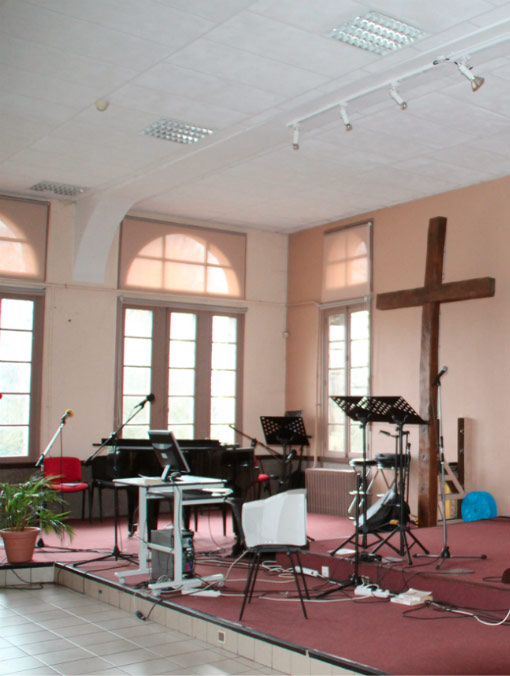 |
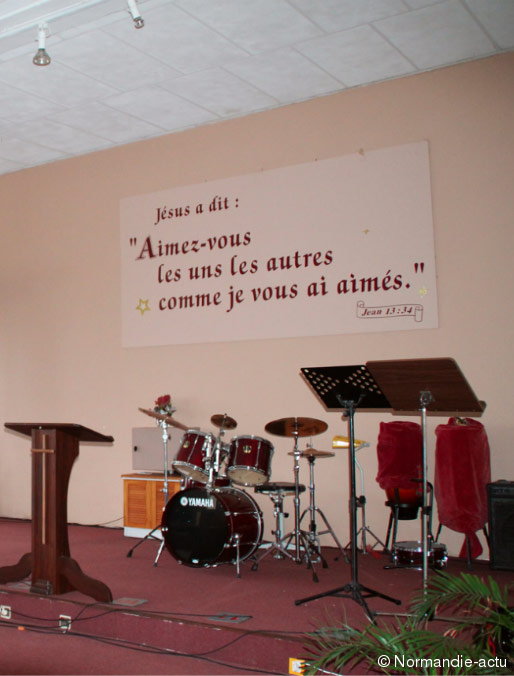 |
|
De nos jours, le rez-de-chaussée
Today, the ground floor of the
|
du bâtiment est dédié au culte
building is dedicated to worship |
|
| |
|
|

















 Le jeudi 7 novembre 1940, vers 2 h 15 du matin, au cours d'une très forte tempête, le pylône Ouest se tord sur sa base comme pris de convulsion puis s'effondre dans les jardins jouxtant l'orphelinat Saint-Michel, dans un fracas épouvantable de ferraille, arrachant de terre son énorme assise en béton. Le pylône côté Est, pouvant servir d'amer aux alliés, sera dynamité par les Nazis le 12 novembre 1943
Le jeudi 7 novembre 1940, vers 2 h 15 du matin, au cours d'une très forte tempête, le pylône Ouest se tord sur sa base comme pris de convulsion puis s'effondre dans les jardins jouxtant l'orphelinat Saint-Michel, dans un fracas épouvantable de ferraille, arrachant de terre son énorme assise en béton. Le pylône côté Est, pouvant servir d'amer aux alliés, sera dynamité par les Nazis le 12 novembre 1943 


 12 November 1943: in Fécamp, the Nazis dynamited the last intact pylon that could be used as a landmark by the Allied air force. This date marks the end of the radio epic in Fécamp.
12 November 1943: in Fécamp, the Nazis dynamited the last intact pylon that could be used as a landmark by the Allied air force. This date marks the end of the radio epic in Fécamp.



 11 août 1944 : vers minuit, un gros bi-moteur allemand qui revenait d'un raid sur l'Angleterre, toucha le pylône. La violence du choc le désempara et il alla s'écraser dans une cour de ferme. Les membres de l'équipage furent carbonisés. L'ennemi qui occupait la station pensait qu'il s'agissait d'un avion anglais mais à leur joie, succéda la stupeur quand ils virent que c'était un avion allemand
11 août 1944 : vers minuit, un gros bi-moteur allemand qui revenait d'un raid sur l'Angleterre, toucha le pylône. La violence du choc le désempara et il alla s'écraser dans une cour de ferme. Les membres de l'équipage furent carbonisés. L'ennemi qui occupait la station pensait qu'il s'agissait d'un avion anglais mais à leur joie, succéda la stupeur quand ils virent que c'était un avion allemand  August 11, 1944: around midnight, a large German twin-engine plane returning from a raid on England hit the pylon. The violence of the impact disabled it and it crashed into a farmyard. The crew members were burnt to a crisp. The enemy occupying the station thought it was a British plane but their joy was replaced by astonishment when they saw it was a German plane (according to the local press)
August 11, 1944: around midnight, a large German twin-engine plane returning from a raid on England hit the pylon. The violence of the impact disabled it and it crashed into a farmyard. The crew members were burnt to a crisp. The enemy occupying the station thought it was a British plane but their joy was replaced by astonishment when they saw it was a German plane (according to the local press)



